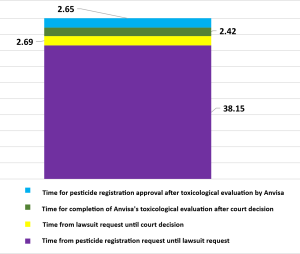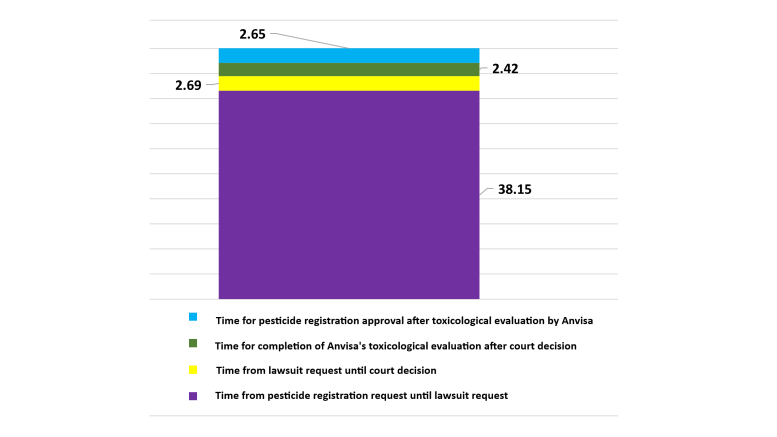“Once the preliminary injunction was granted, Anvisa completed the toxicological evaluation in an average of 2.42 months…”
Luciana Fabri Mazza is a partner at the Law Firm Mazza & Manente de Almeida Advogados, a lawyer graduated from Mackenzie University, postgraduate in tax law and tax procedure from the Brazilian Institute of Tax Studies, specializing in public and corporate law.

Luciana Mazza, partner at Mazza & Manente de Almeida Advogados
The delay in approving registrations of pesticides has led requesting companies to resort to the Judiciary to anticipate the completion of evaluations by the Regulatory Agencies: Ibama (Environment), Anvisa (Health) and the Ministry of Agriculture.
In the last three years, almost a third of the registrations of equivalent formulated products (generic pesticides) were approved through lawsuits that aimed to establish deadlines for completing evaluations.
To better understand the dynamics and timeframes of these procedures, we performed a survey on the registrations of generic products approved by Anvisa in 2023 after court decisions, considering criteria such as the specific court and the time taken to grant the measure. Environmental evaluations, which are the responsibility of Ibama, were not included in this analysis.
We observed that toxicological evaluation represented, during the period analyzed, one of the main bottlenecks for the pesticide registration process. The average time between the pesticide registration request and the filing of the lawsuit request was of 38.15 months.
After the lawsuit was filed, the situation changed significantly. The average time between filing and granting preliminary injunctions for completion of toxicological evaluations was 2.69 months. Once the preliminary injunction was granted, Anvisa completed the toxicological evaluation in an average of 2.42 months. With the approved evaluations from Anvisa and Ibama, the Ministry of Agriculture then is responsible for approving the registration, which occurred within two months in 60% of cases.
These data demonstrate that the technical-administrative process becomes faster after judicial intervention. The average total processing time for the evaluated products was 47 months, significantly lower than the overall average of 68.35 months for formulated product registrations that followed the ordinary procedures (no lawsuits) in 2023.

Lawsuits: average time in the steps for toxicological evaluation (months)
The legal basis for these actions is the right of the registrant companies to have their registration requests reviewed within the legally established deadline or, if this deadline has already been missed, within a reasonable timeframe. Each registration application is subject to the law in effect on the date of the pesticide registration request. Failure to comply with the deadline for completion of technical evaluations by the Regulatory Agencies allows the applicant company to seek legal measures.
These actions initially aim to request an urgent measure to establish a deadline for the competent authorities to complete their evaluations. The decision does not interfere with the merits of the technical evaluations of the Regulatory Agencies, but merely determines that the analysis for registration purposes must be completed, without administrative delay.
Despite legal changes over time, including the significant increase in deadlines brought about by Decree No. 10883/2021, deadlines for technical evaluations continue to be breached by the Regulatory Agencies, regardless of the law in force at the time of the protocol.
For example, in October of 2025, the four-year term of the Transition Rule applied by Decree No. 10833/2021 to all processes filed up to October 7th, 2021, will expire, but there is no indication that the technical evaluations of all these processes will be concluded.
With the entry into force of Federal Law No. 14785/2023, also known as the New Pesticides Law, which repealed Law No. 7802/1989 and introduced new deadlines for completing the analysis of registration requests, changes were also expected in this scenario.
With the New Pesticides Law in force for a year and a half, however, there is already a failure to comply with the established deadlines, giving rise to the filing of a lawsuit to guarantee the applicants’ right to have their registration requests analyzed within a reasonable time.
The Regulatory Agencies justify their failure to comply with the deadlines of the New Pesticides Law by claiming that they are still awaiting its regulation, which should provide for a new transitional rule.
We emphasize, however, that although it has not yet been regulated, unlike the previous Law (Law No. 7802/89), the New Pesticides Law dedicated its Article 3 to providing detailed deadlines for completing registration requests. This has an important implication: any eventual regulation of the Law should not address these deadlines, which are already duly established.
Regarding the regulation of Law No. 14785/2023, it is important to note that Article 3, § 17, states that “in regulating this law, the government must seek (…) to reduce (…) the time required to complete the analysis of registration processes”. Therefore, it would also not be appropriate, through its regulation, to establish a transitional rule that contradicts this command and increases the timeframes for completing the evaluations. It is also worth noting that the Regulatory Agencies themselves maintain the filing of lawsuits as a criterion for prioritizing the analyses.
In this scenario, legal action has become a legitimate tool to address delays in the applications for registration of pesticides filed under any of the laws regulating the matter – some of which have been pending for more than six years – based on the legal deadlines in force at the time of the registration requests and supported by the constitutional principles of reasonable procedural duration and administrative efficiency.
READ MORE:

